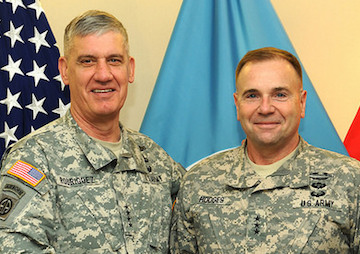The Numbers Racket: U.S. Africa Command Clams Up After Contradictory Statements to Congress
Somehow, between 2015 and 2016, more than 200 AFRICOM missions from 2014 simply vanished. And the Senate Armed Services Committee apparently hasn't bothered to ask for clarification. Gen. David Rodriguez, commander of AFRICOM, left, with Lt. Gen. Ben Hodges, commander of U.S. Army Europe. (U.S. Army Europe / (CC-BY-2.0))
1
2
3
Gen. David Rodriguez, commander of AFRICOM, left, with Lt. Gen. Ben Hodges, commander of U.S. Army Europe. (U.S. Army Europe / (CC-BY-2.0))
1
2
3
A discrepancy of 232 security cooperation activities can’t be chalked up to a mere miscount. And since both numbers were presented to the SASC in written statements, the AFRICOM chief can’t simply have misspoken.
Such a discrepancy in the total number of “security cooperation activities” conducted by his command raises questions about what AFRICOM is actually doing on the continent (or whether it even knows what it’s doing). The figure Rodriguez offered this year also contradicts projections laid out in U.S. Army Africa (USARAF) documents obtained by TomDispatch via the Freedom of Information Act in 2014. These refer to more than 400 activities scheduled for Army troops alone in Africa that year.
Despite numerous requests over several weeks, AFRICOM has failed to provide any comment or clarification to TomDispatch. It also failed to respond to requests to interview Rodriguez. A Pentagon spokesperson was able to coax a reply out of the command as to the correct number of security cooperation activities in 2014. According to AFRICOM, that number is indeed 363, directly contradicting Rodriguez’s 2015 testimony and suggesting that, whether purposely or not, the general misled members of Congress. Messages seeking comment from the SASC staff, including Dustin Walker and Chip Unruh — spokespeople, respectively, for U.S. Senators John McCain and Jack Reed, the chairman and the ranking member of the committee — were not returned.
“The fact that General Rodriguez gave such wildly conflicting figures, and that members of Congress aren’t pressing him for an explanation, is just one more example of how U.S. military activities in Africa and beyond have spun out of control,” says Hartung.
Bending the Law — or Breaking It?
With Rodriguez, Africa Command, and the staff of the Senate Armed Services Committee staying silent, it’s impossible to know what motives — if any — lay behind the bogus numbers offered by the AFRICOM chief.
The command may, without public announcement, have redefined “security cooperation activities” thanks to an as-yet-unreleased 2014 Defense Department memorandum meant to provide guidance on the so-called Leahy Law, which prohibits the U.S from providing assistance to foreign security forces implicated in human rights abuses. Reclassifying certain types of training missions makes it more difficult than ever to track both the dollars spent by AFRICOM and the number of activities it conducted on that continent.
Africa Command, its subordinate units, and partners also have a long history of being unable to effectively track and manage their own efforts. A 2015 study by the Government Accountability Office noted that AFRICOM “identifies and synchronizes security cooperation activities through various planning processes, but the brigades allocated to AFRICOM sometimes lack key information about these activities.” According to officials involved in the process, “the increasing number of activities being conducted in Africa… challenges the ability of the Offices of Security Cooperation to fully coordinate individual activities with the host nation, AFRICOM, USARAF, the other service components, and DOD executing units.”
A 2013 report by the Department of Defense’s Inspector General on AFRICOM’s Combined Joint Task Force-Horn of Africa found recordkeeping so abysmal that its officials “did not have an effective system to manage or report community relations and low-cost activities.” A spreadsheet supposedly tracking such missions during 2012 and 2013 was, for example, so incomplete that 43% of such efforts went unmentioned.
New definitions, poor recordkeeping, ineffective management, and incompetence aren’t, however, the only possible explanations for the discrepancies. AFRICOM has a history of working to thwart efforts aimed at transparency and accountability and has long been criticized for its atmosphere of secrecy. Beyond spin, the highly selective release of information, the cherry-picking of reporters to cover a tiny fraction of its undertakings, and the issuing of news releases that tell a very limited story about the command, AFRICOM has taken steps to thwart press coverage of its footprint and missions.
After I started asking the command questions about the shifting count of security cooperation activities, Rodriguez told Stars and Stripes that the command had carried out “roughly 430 annual ‘theater security cooperation’ activities” last year, a difference of 30 from the figure he provided to the Senate Armed Services Committee in March. Why he has continued to peddle different numbers at different times is unclear.
Under Section 1623 of Title 18 of the U.S. Code, knowingly making contradictory statements in court or a grand jury while under oath can get you five years in prison. While that statute doesn’t cover Rodriguez’s testimony before the Senate Armed Services Committee, experts point to Section 1621 of Title 18, which prohibits lying to Congress while under oath and Section 1001 covering testimony given while not under oath, as the operative portions of the U.S. Code. A person convicted of the former faces up to five years in jail and fines of up to $250,000. There is, however, a high burden of proof when it comes to perjury, including clear evidence of intent.
Your support matters…Independent journalism is under threat and overshadowed by heavily funded mainstream media.
You can help level the playing field. Become a member.
Your tax-deductible contribution keeps us digging beneath the headlines to give you thought-provoking, investigative reporting and analysis that unearths what's really happening- without compromise.
Give today to support our courageous, independent journalists.






You need to be a supporter to comment.
There are currently no responses to this article.
Be the first to respond.